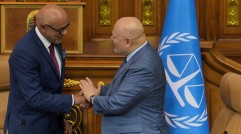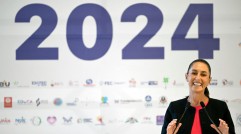Sprint Close to Obtaining $45B for T-Mobile Deal Despite Government Hesitation
Despite mounting pressure against a merger with T-Mobile, Softbank-owned wireless carrier Sprint is reportedly close to obtaining $45 billion in debt financing for the deal from major banks, a DealReporter report revealed Wednesday.
According to DealReporter's source, JPMorgan, Citigroup, and Bank of America Merrill-Lynch will all help finance the deal, though the amount could be reduced by $5 billion depending on the final deal itself. Sprint is reportedly interested in hammering out the deal before having to disclose its fourth-quarter earnings report next week.
The proposed merger would combine the nation's third and fourth largest wireless carriers in an effort to better combat the big two that are Verizon and AT&T. Even with a combined Sprint and T-Mobile customer base, the second largest carrier in the United States, AT&T, would have more by itself.
The deal, however, has some serious opposition from the U.S. government.
The U.S. Department of Justice's antitrust division was the first to voice its concerns, stating the argument that the two wireless carriers together can provide a more competitive marketplace against Verizon and AT&T isn't convincing enough. A similar deal between AT&T and T-Mobile was struck down in 2011 by the government, with Sprint itself going on the record to oppose the deal
"Removing T-Mobile from the market would substantially reduce the likelihood of market disruption by a maverick," Sprint said in 2011. "T-Mobile, as one of only four national carries, provides a critical constraint on AT&T's consumer retail prices."
The Federal Communications Commission (FCC) isn't too happy either. In a recent meeting with Sprint board members, FCC chairman Tom Wheeler stressed that the government is wary of consolidation. Fewer carriers, in theory, means less competition, which in turn could lead to higher costs carried by the consumers. Sprint and T-Mobile, on the other hand, argue that the existing marketplace in which 75 percent of wireless customers nationwide belong to either Verizon or AT&T, according to Bloomberg data, is not as open as regulators think it is.
"If the government wants us to have a competitive environment, you are going to make sure that the duopoly doesn't use their prowess to crush the little guys and have this sub-1 GHz spectrum be moved all to them," T-Mobile CEO John Legere said during a television interview on Bloomberg West. Legere initially seemed skeptical of a deal with Sprint, but has changed his stance in recent weeks.
"We're all going to need better scale and capability. The question starts to be: How do you take the maverick and supercharge it? We either need more spectrum and capability, a lot more investment, or we need consolidation."
At the moment, T-Mobile offers the lowest average monthly cost at $120 of all carriers, according to data from Cowen and Company. With an aggressive marketing strategy based on doing away with industry norms, T-Mobile was described as a "self-described 'challenger brand,' that historically has been a value provider" by antitrust officials during the 2011 AT&T and T-Mobile decision.
Given Sprint's history of opposing the 2011 deal, the beloved maverick status T-Mobile has gained over the last few years, the deal won't be easy to push through the government, but indications are that Sprint will try anyways. Whether or not the carrier is successful remains to be seen.
Subscribe to Latin Post!
Sign up for our free newsletter for the Latest coverage!














